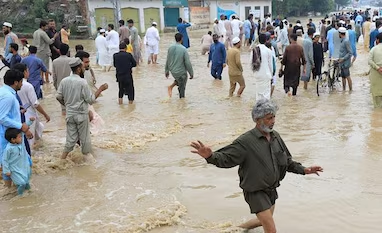Flash floods kill at least 50 in Afghanistan
Officials have reported that a minimum of 50 individuals lost their lives due to flash floods induced by intense rainfall in central Afghanistan.
In Ghor province, authorities have disclosed that numerous individuals are unaccounted for, as residents sought refuge on higher ground just moments before the deluge struck.
The floods have also resulted in the deaths of thousands of livestock, the destruction of approximately 2,000 homes, and extensive damage to numerous others.
This recent spell of heavy precipitation follows widespread flooding across northern and central regions earlier this week.
In the provincial capital of Firozkoh, officials state that roughly 2,000 shops are submerged underwater, with most access roads rendered impassable.
A local resident recounted the harrowing experience of witnessing “a massive and terrifying flood” that swept away everything in its path. He and his family managed to escape to safety after receiving alerts from authorities and mosque loudspeakers.
Zahir Zahid told the AFP news agency: “I watched the flood destroy my house with my own eyes. Women and children, everyone was crying.”
The province’s disaster management department declared an “emergency” and appealed for shelter, food, and water.
The spokesperson for provincial governor Abdul Wahid Hamas said dozens of people were missing.
More than 300 people died last week, according to UN and Taliban officials, after unusually heavy rains devastated scores of villages in the north.
This has left much of the farmland covered in thick mud in a country where 80% of the more than 40 million people depend on agriculture.
UN agencies have warned that the number of people who have died in the latest floods may rise as rescue efforts have been severely hampered without access to the affected areas.
The heavy rain has come after the country experienced a prolonged period of drought earlier in the year.
Climate analysts say Afghanistan – already war-ravaged and alienated from the world since the Taliban took power in 2021 – is one of the least prepared countries to tackle the impacts of climate change.
Afghanistan’s meteorological department has warned of more rain and possible floods across all of the country’s provinces.
The worst-hit in the north, Baghlan, remains inaccessible by trucks, according to the UN’s World Food Programme.
The UN says survivors displaced in earlier flooding have been left with no home, no land, and no source of livelihood.


